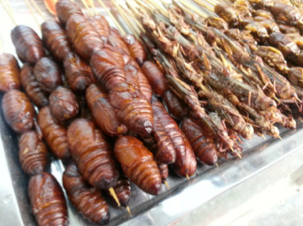By Jiyoung Sohn
BOSTON, April 27—It was a beautiful and sunny Saturday in Boston. As I walked down the city’s streets, it was difficult to believe that just a few days ago, they were littered with explosive debris and splattered with the blood of the runners and bystanders of the Boston Marathon bombings. While city authorities have cleaned up the physical traces of the tragic day, my trip to Copley Square has made one thing evident: its memory lives on.
A memorial has been set up in Copley Square, an area near the Boston Marathon’s finish line. Installations feature separate crosses for each of the victims of the bombings as well as one remembering Sean Collier, the MIT security officer who was killed by perpetrators of the bombing while they were on the run. A message board featured personal words of encouragement from visitors from all over the US who had come to pay their respects to the victims of the bombing. Personally, I left a word of encouragement from Hanover, NH.
A large crowd, including several media crews, gathered around the site, solemnly sharing feelings of sorrow and grief for the victims of this shocking event. Flowers, running shoes, dolls, T-shirts, and posters were laid down in different installation blocs which were then filled with hand-written messages urging Boston to “stay strong” from students and supporters from all over the United States and the world. The memorial also included a magnificent display of several guardrails with American flags, encouragement messages, and running shoes tied over them. Later, I found out that these were some of the same guardrails that were used during the marathon itself. Paper doves and thoughtful message notes hanging in the nearby trees also added a sense of closeness to the scene.
Although the horrors of the Marathon bombings engulfed the US for several days as Bostonians experienced an emergency lockdown and a vicious manhunt, there was a sense of healing, faith, and indivisibility in Boston that arose from the rubbles of the tragedy. “Boston Strong” signs that spotted landmarks throughout Boston affirmed that community. The city of Boston and visitors came together in extraordinary unity and genuine mourning for the lives lost. I was humbled by how tragedies can result in heightened solidarity. Amidst the terror and fear, Boston and the rest of the nation responded with perseverance and warmth.
Upon seeing so much unity among a diverse population, I was reminded of the popular image that was spreading through social media — messages of condolences from Syrian Bombing victims and the warm response from Bostonians. This interaction reveals international bonds that surpass the actions of a few radicals, restoring faith in the goodness of humanity. Moreover, as horrible as the Boston Bombing was, it compels us to become more aware of the daily suffering of war-torn nations and appreciate the relative safety and peace that America enjoys.
It is difficult to come up with a single answer that can give a clear remedy to all these questions and problems. Nonetheless, the experience of the Boston bombing certainly leaves us with food for thought for policymaking and social change in the future.




















